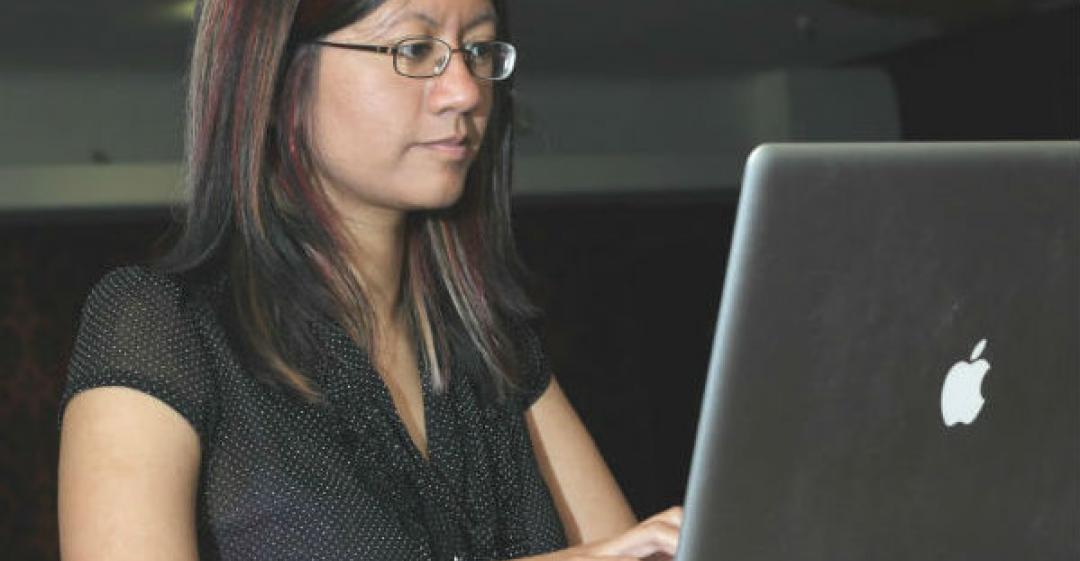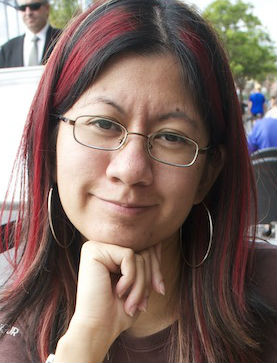“Somehow I'd squashed those childhood desires, in order to get a 'proper job'.”

What work were you doing previously?
I was a Corporate Tax Accountant. I started as a trainee accountant in December 2004, qualifying as a chartered accountant in 2008. I worked for a large global accountancy firm, and a mid-sized UK accountancy firm. I then took a temping contract in a large international bank in the City and left the profession in 2009.
What are you doing now?
I am now a freelance journalist, editor and writer.
Why did you change?
I hated being an accountant from the very start, but I went into accountancy because I thought it was what I "should" do. I had a Maths degree from UCL, but when I told the university careers adviser I actually wanted to be a journalist or writer, they told me I'd done the wrong degree — I now know that's not true!
I'd always loved writing and reading. Right from when I was little I kind of knew that's what I wanted to do, but somewhere along the way I learned to squash those desires in order to get a "proper job". I suppose for me the question isn't really "why did I change" but "why did I become an accountant in the first place - and why did I stay in it for so long?"!
When was the moment you decided to make the change?
There were many times in my accountancy jobs where I'd try to sabotage my career; taking lots of sick days to read career change books, and even trying to get myself fired! I tried to suppress and squash my feelings about my job so much that it started to have a negative effect on my health. I was prescribed anti-depressants at one point, but they didn't work because I hadn't addressed the underlying cause: the job I was doing every day.
What brought matters to a head (and the moment I finally realised I HAD to leave the profession, no more excuses) was when I started getting very severe chest pains in spring 2008, despite being only 26 and in very good health. The doctor couldn't pinpoint the cause and the medicine he gave me didn't work. The chest pains were so severe they were terrifying, and they were constant - from the moment I woke up till the moment I fell asleep. They carried on every day continuously for two months until my boyfriend begged me to quit my job. I handed in my notice even though I had no other job to go to.
The funny thing was, as soon as I handed in my notice, the pains disappeared. I was so scared of them returning, that that was the moment I finally decided to make the change.
Are you happy with the change?
Absolutely! I think it's the best thing I've done. Granted, there are things I don't enjoy as much: occasionally having to type up interview transcripts being one example, and the occasional not-so-interesting article commission being another. But this work suits me so much better — and makes me so much happier — than my previous work I don't really think I should complain!
What do you miss and what don't you miss?
The only thing I miss about my previous job is the income — it was far, far higher than it is now (especially when I was working in a City bank) and of course I was paid more regularly. Nowadays, as a freelancer, my income is irregular and goes up and down.
I don't miss my ex-colleagues, the constant pressure to pass exams, or working in the same office every day. I don't miss the bitching from people who felt just as frustrated, trapped and miserable as me. I don't miss the clients who raged at you when you dared to suggest they had a tax bill to pay(!), and I don’t miss feeling like I had to keep these particular clients happy as my pay depended on them.
How did you go about making the shift?
The real launchpad was getting a two-week unpaid work experience stint at The Independent. I spent those two weeks intensively learning everything I could about newspaper journalism. I got four articles published under my by-line in June 2009, and used that as a portfolio to launch my journalism career.
I then started researching the publications I wanted to write for. I rang their editors to introduce myself and tell them why I was great fit for their publication. I got rejected by the first few, but finally landed some paid articles. It really grew from there. When the rest of the accountancy and tax press got to hear about me, they started commissioning me for work. I earned very little for the first 11 months, but a year after I changed career I was definitely earning enough to pay the bills.
How did you handle your finances to make your change possible?
I saved as much as I could, as aggressively as I could (I had about 9-12 months worth of living and food expenses saved when I finally made the career change), and became quite ruthless in cutting out unnecessary expenses.
I didn't have any debts either (apart from my mortgage and a small-ish outstanding student loan), so that made changing career a lot less stressful than it otherwise would have been.
What was the most difficult thing about changing?
The most difficult issues about changing careers, for me, weren't financial or physical - they were entirely mental and emotional. Dealing with my own fears. Constantly second-guessing myself and lying awake at night worrying I'd made a mistake. Trying not to let the inevitable rejections I got as a newbie crush my determination. Trying to explain myself, in the early days, to friends and family who probably thought I was utterly mad to quit my job to write, even though they all meant well. Trying to resist being sucked back into an accountancy/tax job because it was what I knew and what I was most familiar with, even if I knew I would hate it all over again.
What help did you get?
I had a lot of support from my boyfriend (now husband), who believed in me long before I even believed I can do it. Having that kind of support — whether it's from a partner, friend or family member — is invaluable.
Reading success stories, such as the ones on the Careershifters website, also helped inspire me and keep going when I started to doubt myself. If they could do it, then so could I.
I also read some great books about writing and freelance writing for a living, such as:
- "The Renegade Writer", by Linda Formichelli and Diana Burrell
- "The Greatest Freelance Writing Tips In The World" by Linda Jones
- "The Freelance Writer's Handbook" by Andrew Crofts
If you are going to freelance, I think it also helps to read books about changing careers and running a small business. The ones I found particularly helpful (and fun to read) were:
- "Screw Work Let's Play" by John Williams
- "Go It Alone" by Geoff Burch
What have you learnt in the process? 
I spent years thinking there was something wrong with me — why couldn't I just be happy in this "good job" and "good career" and just accept my lot like everyone else? I even believed my accountancy colleagues when they told me I was just simply the sort of person who would never be happy. For years I believed them. I have now learned that that is NOT true — and if anyone tells you there is something wrong with you for being so desperately unhappy in your job, PLEASE believe me that it's not you. You're just in the wrong job.
Funnily enough, I learned that while I hated accountancy and tax when I had to do it as a day job, I have developed an interest in it now that the only accounts and tax returns I do are my own. Even if I didn't enjoy being a tax accountant, I do enjoy writing about taxes!
I've also learned a lot about myself: how to motivate myself, how to work from home, and the ways of working that produce the best results for me. Self-employment and its challenges have taught me far more about myself than employment ever did.
What do you wish you'd done differently?
I wish I hadn't let my fears hold me back so much. Even after I started actually earning some money for my writing, I was still terrified of failing, and that fear even stopped me from taking some good opportunities that I was lucky enough to get in the early days. It meant that it took a year before I could say I was earning a living from it. There's a good chance it may not even have taken as long as that if I hadn't let fear paralyse me.
I wish I hadn't let my pride hold me back so much. I got so attached to this idea of myself as a "successful" person that I was too proud to admit, for several years, that I'd completely got it wrong with my career.
What would you advise others to do in the same situation?
Don't stay in a job you hate for so long that you end up with severe stress-related chest pains! On a serious note, don't stay in a job that's making you miserable for so long it starts affecting your health. Please, please make sure you leave BEFORE things get that bad. Nothing is worth sacrificing your physical health or your sanity for.
Don't get bogged down in "research" of your ideal career and endless reading about it — there is no substitute for actually experiencing it yourself. Taking on two weeks of unpaid work experience on a national newspaper really helped me clarify my thoughts on whether this was the work I wanted to do.
If you are not able to do that, and you don't want to have to quit your job to do it(!), look for ways within your current job you can have some semblance of your intended lifestyle/job, and do them wherever possible.
What lessons could you take from Santhie's story to use in your own career change? Let us know in the comments below.



